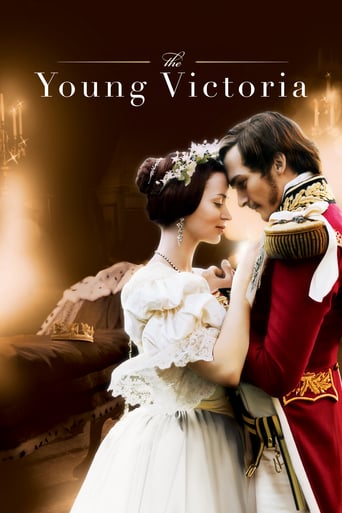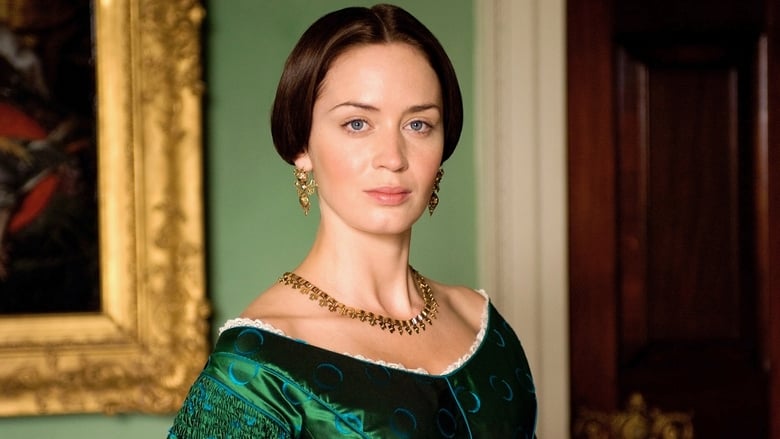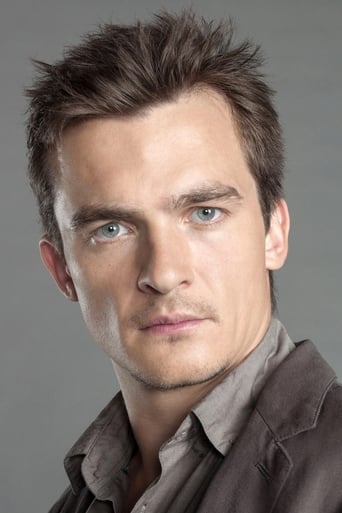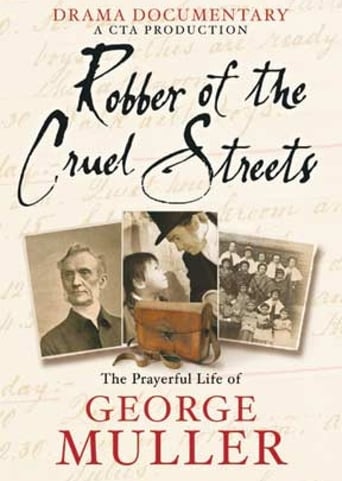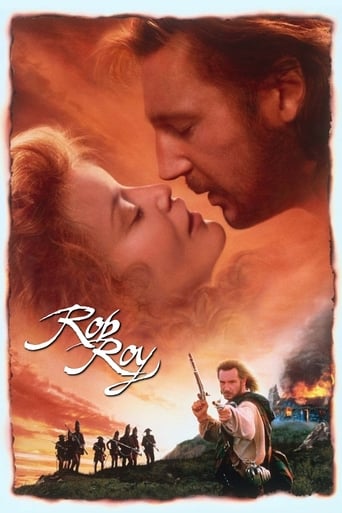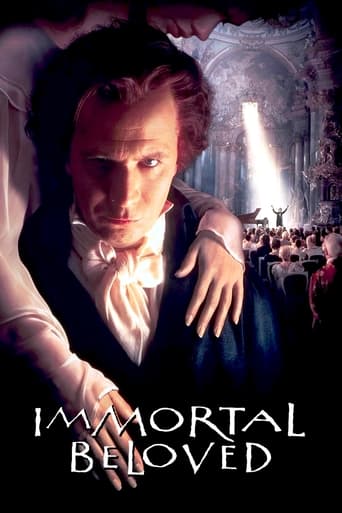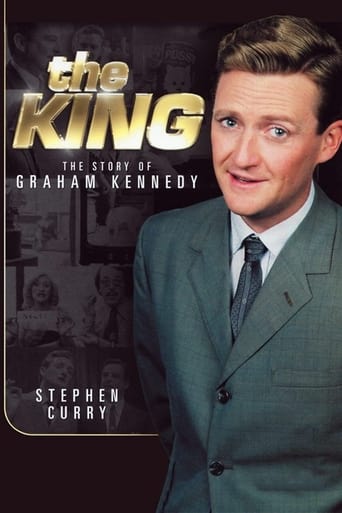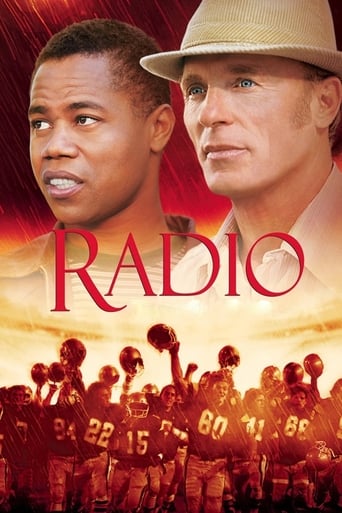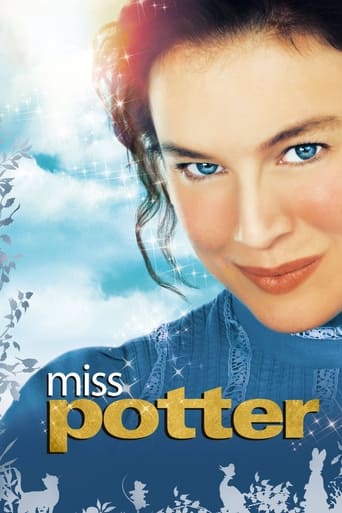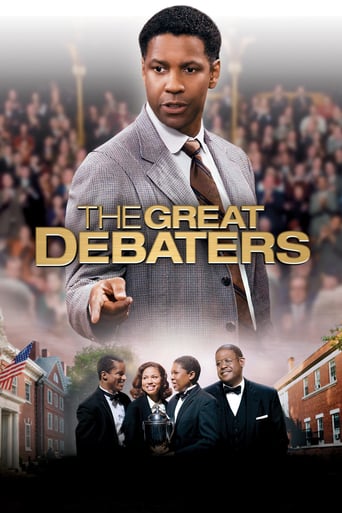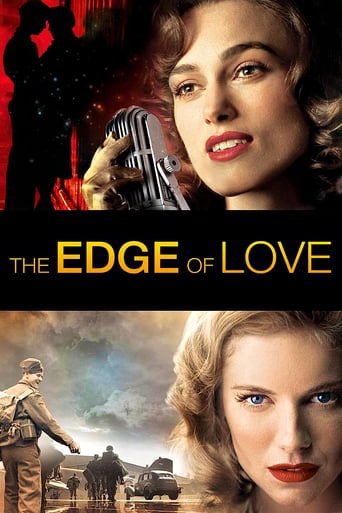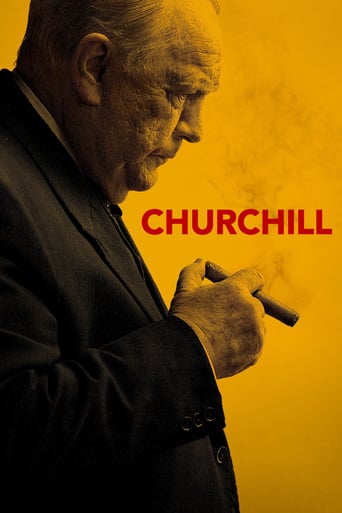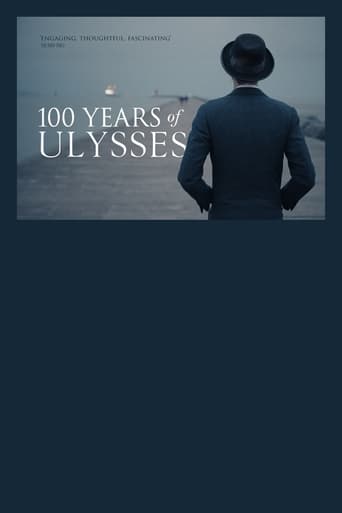The Young Victoria (2009)
As the only legitimate heir of England's King William, teenage Victoria gets caught up in the political machinations of her own family. Victoria's mother wants her to sign a regency order, while her Belgian uncle schemes to arrange a marriage between the future monarch and Prince Albert, the man who will become the love of her life.
Watch Trailer
Free Trial Channels
Cast


Similar titles
Reviews
Wow! Such a good movie.
Self-important, over-dramatic, uninspired.
if their story seems completely bonkers, almost like a feverish work of fiction, you ain't heard nothing yet.
This is one of the few movies I've ever seen where the whole audience broke into spontaneous, loud applause a third of the way in.
I feel a little naughty watching this right now, as ITV are currently transmitting Jenna Coleman's portrayal of Victoria, but I had to see it. A totally sumptuous film from start to finish, it looks sublime, the costumes are meticulous and opulent. Ir is easy to see the involvement of Julian Fellowes, it has a lot of historical accuracy, many costumes are exact copied for instance. The location work too, is simply first class.I know during its Cinema run, many people raised an eyebrow at Emily Blunt's casting as the young monarch, but in my humble opinion she does an incredible job, an utterly beautiful girl, she has more then enough presence to fill the shoes. Some of my favourite actors here, Miranda Richardson, Jim Broadbent etc, and they are all brilliant, but it's Blunt you can't help but keep your eyes fixed on.The music is glorious, from the very off, we here Zadok the Priest in the opening, and it just gets better.A tragic, but wonderful story truly is brought to life. Pure and raw emotion is captured in this film, the torment of longing and missing someone is beautifully captured, a very human film. 9/10
Canadian screenwriter, film editor and director Jean-Marc Vallée's fifth feature film which he wrote with English author, screenwriter and director Julian Fellows, is inspired by an idea conceived by the Duchess of York. It premiered in England, was shot on locations in England and is a UK-USA co-production which was produced by producers Graham King and Sarah Ferguson. It tells the story about an English seventeen-year-old daughter and only child named Victoria who was born in the royal residence of Kensington Palace in London, England in the late 1810s during the reign of King William IV (1765-1837), when an English political leader named Lord Melbourne (1779-1841) was prime minister, who lost her father, the Duke of Kent, before she had lived a year and who prepares to become successor to the throne as monarch of the United Kingdom.Distinctly and precisely directed by Canadian filmmaker Jean-Marc Vallée, this quietly paced and somewhat fictional tale which is narrated by and mostly from the main character's point of view, draws a silently eloquent portrayal of a German emigrant named Albert and his correspondences with a diarist and first ascendant to take up residence in Buckingham Palace, London, England who used to speak about herself in the third person and worried that women might be unsexed by enfranchisement. While notable for its atmospheric milieu depictions and distinct cinematography by cinematographer Hagen Bogdanski, this dialog-driven story about English queenly history was made more than six centuries after the birth of a queen consort of England and only surviving child of Joan I (1273-1305) named Isabella of France (1295-1358), more than four centuries after an English 16th century poet named Lady Jane Grey (1535/36-1554) who was Queen for nine days was taken to Her Majesty's Royal Palace and Fortress of the Tower of London, a Queen of England, France and Ireland forenamed Mary who liked to execute Protestants as she wanted to make England Catholic again, was crowned at Westminster Abbey (1553) the same year as an English fifteen-year-old King named Edward VI (1537-1553) who was England's first Protestant sovereign said: "I am glad to die" and the French Wars of Religion (1562-1598) and three centuries after a French fille de France named Henrietta Maria (1609-1669) who was born in the Louvre Palace in Paris, France married an English King named Charles I (1600-1649) and an English 17th century poet named Anna Bradstreet (1612-1672) in her poem (1650) to a Queen called Gloriana who caused a cult of virginity and liked to execute Catholics aiming to make England Protestant wrote: "To read what others write and then admire Now say have women worth, or have they none? Or had they some, but with our Queen is't gone? Nay Masculines, you have thus taxˈd us long, But she, though dead, will vindicate our wrong. Let such as say our sex is void of reason. Know 'tis a slander now, but once a treason." Made more than three centuries after an English 17th century poet from Great Britain's eleven years as a Republic or The Commonwealth (1649-1660) and one of the first Englishwomen to make a living as an author, named Aphra Behn (1640-1689), in her poem called " Imagined more than woman" (1688) wrote: " When so much beauteous Woman is in view. Against thy charms we struggle but in vein. Why with deluding form thou giv'st us pain. While the bright Nymph betrays us to the Swain " more than two centuries after the Witchcraft Act of 1735, English 19th century poets named William Wordsworth (1770-1850) and Samuel Taylor Coleridge (1772-1834) initiated the Romantic Age (1798) and an English 18th century poet named Mary Darby Robinson (1757-1800) wrote: " Why then is she denied the exercise of the nobler feelings, an high consciousness of honour, a lively sense of what is due to dignity of character? Why may not woman resent or punish? Because the long established laws of custom, have decreed her passive?" (1799), more than a century after the birth of an English 19th century angel maker named Amelia Dyer (1837-1896), Victoria's accession, English 19th century painters named Susan Isabel Dacre (1844-1933) and Annie Swynnerton (1844-1933) began studying at the Acadèmie Julian (1868) in Paris, France, the publication of "The Maiden Tribute of Modern Babylon" (1885), the Children's Charter (1889), the Housing of the Working Classes Act 1890, the Whitechapel murders (1888-1891), an Irish author pen named herself Sarah Grand (1854-1943) in accordance with the ideal called New Woman, twenty-four years after an American singer forenamed Suzanne sang: " he said I am not fighting for you anymore he said I've watched your palace up here on the hill and I've wondered whose the woman for whom we all kill the young queen she fixed him with an arrogant eye ..." and nine years after a law to promote equal access for women and men to electoral mandates and elective functions was ratified in France (2000), this regal retrospection contains a great and timely score by composer Ilan Eshken.This abridged and conversational period piece which is set in the early Victorian era (1837-1901) in England in the early 19th century where Jane was wet-nursed which could cause emotional distance, baby-farming was practiced, the world's first underground railway system was opened (1863), an unidentified subject murdered numerous women who were scapegoated as the causers of all STIs, subjected to inspections in locked hospital wards and many thought should be rehabilitated, some kept in institutions were they could do needlework and laundry work and where a mother of nine children, who survived seven assassination attempts is ascribed an hereditary title which she would own forever, is impelled and reinforced by its cogent narrative structure, subtle character development, rhythmic continuity and the mannerly acting performances by English actress Emily Blunt and English actor Rupert Friend. A courteous narrative feature.
As I said on another post, I love period pieces. This one was very good too from a lot I have watched until now. But a bit flawed too. Emily Blunt was a great actress, she did a very good job, but not her best. Now I'm not an actress to dispute other's abilities to portray a character, but as a viewer giving his three cents I just got a little bit annoyed by her constant laughing at some scenes. I don't know the history about Queen Victoria, nor I read or learned about who and how she really was, but from this movie she seemed not that royal-sh. But Mrs Blunt still did a great job though, her laugh didn't made me rank lower this movie. The story was slow, decent and beautiful by the end. The acting was great, Rupert did a wonderful job as prince Albert. He is new for me on screen, unfortunately I haven't seen other production's by him until now, but I'm looking forward from now on. The costume and designer's were great also. But it didn't make me feel that I was watching a 1800's placed movie but a really modern one. Hope everyone understands what I mean.All in all it was good. Minor flaws, but worth watching.8/10
Before seeing this film, my only experience of Emily Blunt acting in anything, was a horrible performance in 'The Devil Wears Prada', in which she was either miscast, or just didn't have the acting skills to convey. All of a sudden, here she is as 'The Young Victoria' and she's nothing less than sublime. The same can be said of much of the cast, I've never been a huge Paul Bettany fan, but he captured just the right balance of love/hate for his character. Mark Strong also, who seems to always get the baddie role is good. One questionable piece of casting, Miranda Richardson, forever 'Queenie' in 'BlackAdder' is also very good and i didn't find myself thinking of Baldrick or Edmund at all. The film is essentially, at heart, a love story, and a very good one it is. There's some great inventive camera work at times, which is never over indulgent, but actually serves the scenes well when it's sparingly used. The script is very good and the locations are grand and impressive. For anyone that loves this sort of thing, or just wants a brief history lesson, there's lots of offer.

